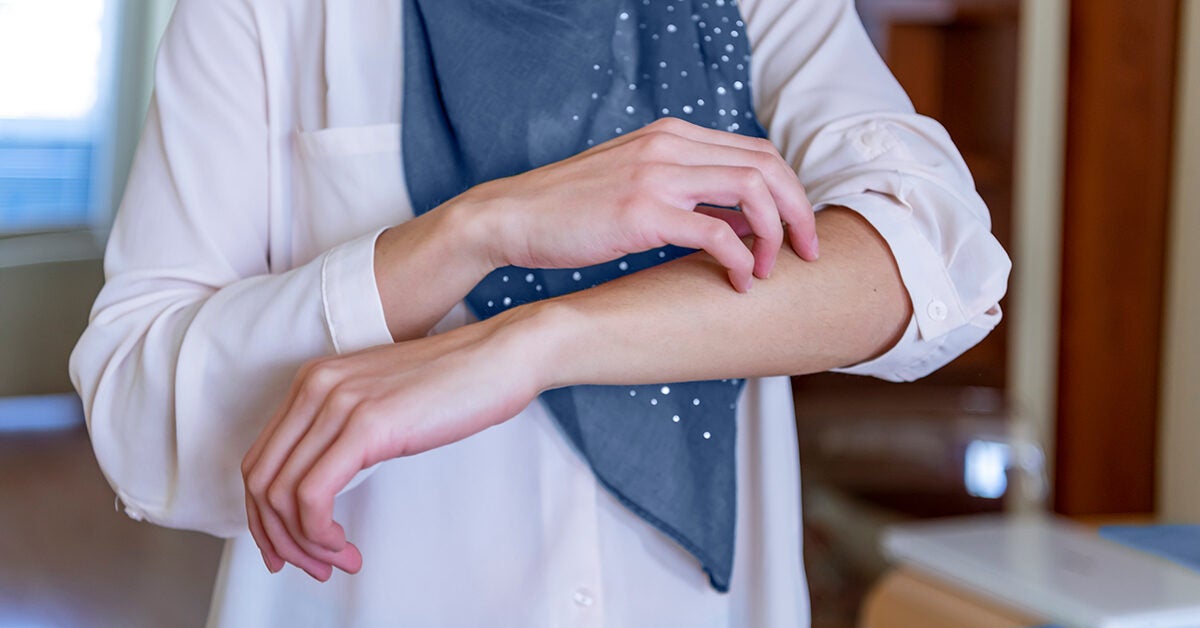Anxiety and Itching: Why It Happens and What to Do - PsychCentral.com

You're anxious, and your skin keeps itching. Are these symptoms related?
Though you might not think it, your skin can reveal some of your deepest emotions. Just think about the last time you blushed from embarrassment or felt goosebumps while listening to inspiring music.
Anxiety, in particular, has several ways of showing itself in the physical body: It can cause shaking hands, sweating, butterflies in your stomach, or a lump in your throat.
And for some people, anxiety can cause itchy skin. Feeling itchy from anxiety is called "psychogenic itching." While this isn't extremely common, it's also not rare.
Unlike many other organs in the body, your skin has an immediate reaction to mental stress. Some researchers call it the "brain-skin connection."
Psychogenic itching, or psychogenic pruritus, occurs when psychological factors trigger or worsen itchy skin.
So, how does this happen?
More research is needed to identify the specific mechanisms behind why anxiety and itching go together. But researchers do know that when the body's "fight, flight, or freeze" response is activated under stress, it releases a flood of hormones and other chemicals, such as cortisol and adrenaline.
Stress also activates the immune system to release histamine, a compound known to play a role in signaling itch sensations.
In short-term stress, cortisol acts as an anti-inflammatory and helps balance out the histamine levels. However, during chronic stress, the body becomes less sensitive to cortisol, allowing for more inflammation and itching.
When you reduce anxiety, you might find that your itching goes away. In fact, there's
Anxiety and itching can result in a continuous itch-anxiety cycle. Anxiety leads to itching, which in turn leads to more anxiety, and so on.
Psychogenic itching, as well as other types of chronic itching, can significantly affect a person's mental health and well-being. Many people with chronic itch
One
In another
You might also have experienced the "contagious itch" phenomenon.
If you see your friend scratching, or you're reading about itching or watching a movie with a person scratching, it can make you feel itchy too! Everyone can experience this at some level, but it tends to happen to a greater degree among people with neurotic personalities.
Does anxiety make you more itchy at night?
Some people with anxiety-related itching report that their itching is worse at night. Itchy skin at night is also called nocturnal pruritus. While researchers don't know exactly why this happens, there are a few
First, your body increases blood flow to the skin at night, and your skin tends to retain less moisture — both of which could potentially worsen itchy sensations.
In addition, the body releases fewer anti-inflammatory corticosteroids at night, while releasing higher levels of certain itch-related hormones.
Also, unlike during the day when we have plenty of distractions, lying in bed at night can draw our attention to the sensations in our body, including itchy skin, making it feel more itchy.
Can anxiety cause an itchy scalp?
Some people seem to get an itchy scalp when they have anxiety. Scientists aren't exactly sure why this happens, but we do know that anxiety increases cortisol levels, which are directly linked to hair follicles.
Internal stressors may also be linked to the growth of bacteria and fungi on the scalp, which can cause it to get dry and flaky, leading to itchiness.
Psychogenic itching is still poorly understood, and researchers don't know its true
Some
Psychogenic itching may also accompany other psychiatric disorders, such as:
To find out the cause of your itching, your physician or dermatologist will likely take your medical history, give you a dermatological exam, and request any lab tests or biopsies as needed.
If no medical source for the itching is found, your healthcare professional will work with you to explore other causes, which may include psychiatric reasons like anxiety.
According to the International Forum for the Study of Itch (IFSI), psychogenic itching falls into one of six itch categories:
- dermatological, caused by a skin condition
- systemic, caused by an organ problem
- neurological, arising from nerve problems
- psychogenic or psychosomatic, linked with psychiatric or psychosomatic conditions
- mixed
- other
To date, clinical trials haven't explored the treatments for psychogenic itching. However,
You might also want to try some home remedies for itch, such as cool packs, wet wrap therapy, and applying moisturizer.
Keeping your anxiety levels to a minimum may also help relieve the itch. Try out some anxiety-reducing activities, like:
If you experience chronic itching, you may benefit from talking with a healthcare professional. Seeing a dermatologist first can rule out skin-related causes.
If you believe anxiety is causing your itching, consider trying some anxiety-reducing activities, such as meditation or yoga.
Comments
Post a Comment